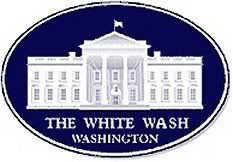Helen Thomas and Tony Snowjob
 Seldom a day goes by in the Brady Briefing Room without everyone's real reporter, Helen Thomas, going after White House Press Secretary Tony Snow for the raw hypocrisy of the Bush administration.
Seldom a day goes by in the Brady Briefing Room without everyone's real reporter, Helen Thomas, going after White House Press Secretary Tony Snow for the raw hypocrisy of the Bush administration.The venerable Thomas was at it again yesterday… This time she followed up on Snow implying that U.S. Senators visiting Syria is inappropriate meddling in American policy, by asking Snow about the U.S. in Iraq and our human-rights record with those kept at Guantanamo Bay without charges or due process.
Q: Who are we to keep meddling in Iraq itself? You talk about meddling and adventuresome? And who are we to give orders to Syria and every other country?Look, folks, I'm ex-military and if someone is a threat to my family, I wanted them picked up and detained. But once reasonable suspicion makes us pick up a suspect, American process and ideals dictate that we give them access to legal counsel, process their case and either charge them or release them in a reasonable amount of time.
Snow: We're not giving orders to anybody, Helen. They've got their choices to make. As far as the Iraqis, they made it clear --
Q: Recommendations, constantly -- they're taking in a thousand refugees every day -- every month from Iraq.
Snow: And many of the refugees in Iraq are there because acts of terror have been perpetrated against them. The Syrians certainly have not been helpful in securing a more peaceful Iraq. The Syrians are under suspicion --
Q: -- them shelter --
Snow: The Syrians are under suspicion of having some involvement in the assassinations of Rafiq Hariri and Pierre Gemayel. They have been fighting mightily against an open tribunal to figure out what happened. And again, our commitment is to democracy and we think that people in the region are going to be better off living in free democracies rather than under the sway of governments that deny their rights and use such things as murder and terror as ways of imposing their will.
Q: That's such a broad accusation. How many people do we have that we have accused and held in confinement in limbo for four years without any trial without any trial, without any charge?
Snow: We have provided for the civil rights -- notice that you've completely jumped off of the topic now of the behavior of the Lebanese. What we are doing is that we have passed a law with regard to the Hamdan legislation that guarantees the civil rights of people who have been pulled off battlefields. We have a reasonable suspicion they're trying to kill --
Q: Four years without a charge or a trial --
Snow: -- who we have reasonable suspicion to believe have been trying to kill Americans. And I don't know about you, but I think that's a bad thing. And I think you do, too.
Q: Tony --
Q: That's a lousy way to twist it.
Snow: No, it's not. What has happened is you and I have now been in a series of questions where I'll answer a question and then the subject changes. And so we've hopscotched from the human rights record of the Syrians to the democracy in Lebanon --
Q: What about our human rights record?
Snow: Well, we will stand by it.
Holding people for four years with no charges and without legal representation is as un-American as it gets and, if we're truly patriotic citizens, we should resent it.
Another reporter called Snow on the fact that for years Bush has been saying that he listens carefully to "commanders on the ground” in Iraq and yet is now talking about sending in more troops despite the commander there, General Abizaid, saying he doesn’t want more troops.
Q: The President has been saying for several years now that he defers to commanders on the ground when it comes to troop levels. General Abizaid was on the Hill about a month ago saying -- he was asked point blank, do you want more troops, he said, no.And, with that, have a non-hypocritical weekend.
Snow: Right.
Q: Would the President be willing to essentially overrule Abizaid and Casey if he felt that there were more troops needed?
Snow: Well, the President will make the decisions that he thinks are most appropriate for a proper way forward. He's the Commander-in-Chief. Again, what people -- military commanders also take a look at shifting situations on the ground. And sometimes they refine their views of what's going on. I'm not saying that's happening. Again, we're getting into this -- I'm back on the tight rope. I'm back into "neither confirm nor deny" mode. But the point is that the President is going to do what he thinks is the most effective way forward so that there can be the conditions that will allow an Iraqi government to defend, sustain and govern itself.
Q: If he felt it was necessary to overrule military commanders to do so --
Snow: He is the Commander-in-Chief, and he will do what he deems necessary.

















<< Home